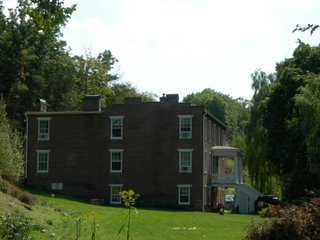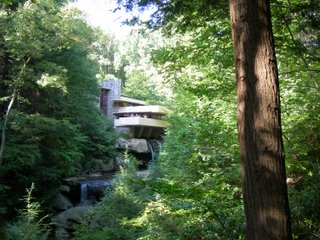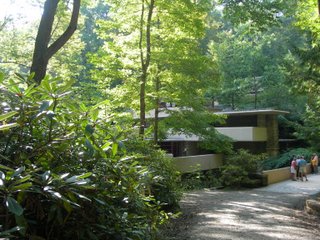Day One: The Road West, Gore and Fallingwater

The road west (aka the quest) beckoned on Sunday morning and the journey began. It is entirely appropriate that the first stop or “place” was only twenty-five miles west of Middleburg in Gore or Back Creek Valley, Va , just outside of Winchester. In this Appalachian foothills hamlet, Willa Cather was born and spent her first nine years. Just one ridge east from West Virginia, this pocket valley was the birthplace and first home which Willa reluctantly left behind at the age of nine when the family joined other Cathers in Nebraska. There are still Cather relatives in Frederick County, Virginia today. With his parents already in Nebraska, Willa’s father decided to sell Willowshade, the family home that Willa remembered vividly and fondly throughout her life. This stately brick home appropriately shaded by willows sheltered the then four Cather children – Willa the oldest, Roscoe, Douglas, and Jessica. Three more children were born in Nebraska. Today, it still sits stately, nestled in trees along busy US 50, simple in design but elegant and comfortable in its still rural landscape. Of her first Virginia home, Willa once told her friend Edith Lewis that she loved “every tree and every rock, every landmark of the countryside, all the familiar faces, all their things… all their ways.”
This tight-knit Virginia community was to be repeatedly called on by

Cather for her fiction. In My Antonia,,Jim Burden, who is ten, leaves his Virginia home to live with his grandparents when his parents die. The Cather family had had a history of susceptibility to tuberculosis, so the drier Nebraska climate figured in their decision to go west. It is natural to romanticize our childhood and our first home, yet by leaving Back Creek Valley at ten, Willa’s memories become caught in the past, sealed from the reality of watching childhood friends and loved ones grow up and change. In a sense, they became completely hers because they were suspended in time and seen perpetually through the lens of her minds eye and the filter of her lifetime experience.
It may be a coincidence or it may be a monumental tribute to the unshakable significance of the first home in her life, but Willa Cather’s most extensive use of Back Creek Valley was in her last novel, Sapphira and the Slave Girl, written fifty seven years after she had left Virginia. Based on the life of her maternal grandmother, the novel’s real success is in the verity of community that she reconstructs. Childhood experience is initial experience written on a pad of utter innocence. Those first feelings, actions, longings become our default settings because they have no competition, no point of comparison in the mind. Their vividness and influence- joyful, painful or otherwise are indelible and to be returned to and reckoned with throughout life.
All through the mountains of West Virginia and Maryland, I was content in the knowledge that I had started this trip on a day which was quintessentially summer. Perhaps there was a small bleep of autumn- an occasional errant maple branch already dazzling in its red and yellow or the plethora of scarecrow door decorations in the houses of every ilk. Yet this day emphatically declared “Summer” even as it rested tightly against the unforgiving calendar indicators and our decked-door expectations of fall.
It was fitting to use the second part of this first day to visit one of my favorite “places’ in the world. Fallingwater is an American artistic icon and still seems to boldly state its being. This summer home, designed by Frank Lloyd Wright for the Kaufmann family of Pittsburgh (of Kaufmann Department Store fame. Alas- another victim of the “Macy’s-ization of American retail) is remarkable in its setting over a waterfall deep in the Pennsylvania mountain woods and its insistent vision which unifies human living space with the landscape. As I stood in the great room right with its right angles and long furniture perched over the falls with every view shaped by horizontal lines to give the impression of being in the trees over the falls, a young boy on the tour asked why it was so hard to see the falls.

It occurred to me that the point of this house wasn’t seeing the falls but being the falls or one with it, an organic harmonious part of the natural thing itself. This place- this structure is breathtakingly beautiful, but, in the end, it isn’t about the view. It is about being someplace, feeling a part of something more universal and timeless than any postcard or refrigerator magnet can ever capture. This is an evocation of “home” in its most basic sense. Where do we belong? We need the artist to shake the cage, and on occasions to slash and burn our time-warn expectations and give us a refreshed vantage point from which to confront that often illusive but never gone part of us which allows us to glimpse the divine, that which is universal, bigger than us but ironically unmistakably and indelibly us always. Fallingwater takes me there.

Now- on to Pittsburgh and Primanti Bros, home of the pastrami and ham two-fisted sandwich which features the slaw and fries as the upper deck of what can only be described as an Iron City Dagwood-an architectural wonder of the culinary kind and certainly redolent of a more attainable sort of divinity. We are on our way…. VAN WINKLE

0 Comments:
Post a Comment
<< Home